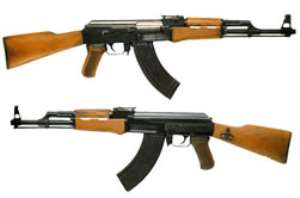
Reacting to the recent increase in armed robbery and killings, Mr Frank Adu-Poku, Director General of Criminal Investigation Department of Ghana Police Service on Thursday disclosed that there were about 100,000 illicit small arms in circulation in the country.
He therefore called for the institution of punitive measures against the illegal possession of firearms to ensure effective control and monitoring of small arms within the country and in the sub-region.
Mr Adu-Poku stated at a two-day consultative workshop on the theme; “Working Beyond the ECOWAS Convention for Global Peace: The Role of Civil Society,” organized by Ghana Action Network on Small Arms (GHANSA) in Accra to galvanize support for the ratification of
the convention.
The CID Director attributed the large circulation of small arms on the streets to the current legislative regime on manufacturing, possession and control of arms which he said, was not deterrent enough due to its obsolete nature.
He said punishment for illegal possession or manufacture of small arms under the Arms and Ammunition Act was insignificant, in the form of fines by the courts.
Mr Adu-Poku said the arms and ammunition acts prohibited the manufacture of any arms and ammunition including explosives except with the written consent of government.
He said even though the law gave directive for manufacturing of arms and ammunitions, nobody had applied, therefore manufacturing of arms and ammunitions by blacksmiths were illegal.
The law only permitted blacksmiths the license to repair imported firearms, and not to manufacture arms.
He attributed the increasing manufacture of arms by blacksmiths to the outdated sentences meted out which, he said, were not deterrent enough to discourage others from perpetuating the offence.
Mr Adu-Poku said current laws also failed to take into account the illegal trans-border movement or transfer of weapons, adding that some people smuggled firearms with impunity due to the porous nature of the ports and borders.
He said the Police Administration, in spite of the challenges had instituted security measures to mitigate its effect through educating the public on security issues and empowering the firearms unit of the Service to effectively deliver.
He said through the assistance of UNDP, the Police Service was running a computerized data base on registration and licensing of small arms, to help keep track of the movement of arms and ammunition in the country.
The Police CID Director said in concert with the Ghana National Commission on Small Arms, the service developed a dialogue with blacksmiths to renounce the production of small arms, especially locally made pistols for other economically viable alternative source of livelihood.
Nana Obiri-Boahen Minister of State at the Ministry of The Interior said the government had recognised that security was no more the preserve of the police, military or state security apparatus but a shared responsibility of all citizens, especially civil society organizations.
Government was committed to strengthen and deepen the partnership that currently existed between government and civil society organizations, so that the people would better secured, protected to go about their daily activities peacefully.
Ms. Afi Yakubu, National Coordinator of GHANSA said small arms and light weapons had fuelled civil wars and other conflicts in Africa causing harm to millions of people, especially women and children.
These small weapons were only part of a larger trade that included heavier and more lethal weaponry, but said light arms are often the problem because they were cheap, easy to transport and could be handled by ill-trained rebel soldiers and even children.
She said recent United Nations reports showed how those weapons were illicitly exported, transported with the connivance of government officials in many countries and smuggled into war zones.
In some areas, automatic weapons were so cheap they could be bought in exchange for a chicken or a few pounds of rice and urged the government to ratify the ECOWAS Convention of small arms and light weapons to demonstrate its commitment to fighting crime.




 Galamsey: Five Burkinabes jailed 20 years each for mining
Galamsey: Five Burkinabes jailed 20 years each for mining
 'It's no crime' – Abu Sakara defends Alan's exit from NPP
'It's no crime' – Abu Sakara defends Alan's exit from NPP
 'We know all your houses, pay your bills now or we’ll disconnect you; we're all ...
'We know all your houses, pay your bills now or we’ll disconnect you; we're all ...
 Impacts of air pollution extremely dire – Clean Air Fund
Impacts of air pollution extremely dire – Clean Air Fund
 Lofortoe Chief gives one week ultimatum to Fulani herdsmen to vacate
Lofortoe Chief gives one week ultimatum to Fulani herdsmen to vacate
 2024 elections: A vote for Mahama will turn Ghana's education system upside down...
2024 elections: A vote for Mahama will turn Ghana's education system upside down...
 Dumsor: NPP will be punished in election 2024 if gov't doesn't address current s...
Dumsor: NPP will be punished in election 2024 if gov't doesn't address current s...
 Akufo-Addo directs GRA, Finance Ministry to renegotiate deal with SML
Akufo-Addo directs GRA, Finance Ministry to renegotiate deal with SML
 Kofi Bentil’s love, support for Bawumia will never represent IMANI – Franklin Cu...
Kofi Bentil’s love, support for Bawumia will never represent IMANI – Franklin Cu...
 NPP outperforms NDC in health infrastructure in Ashanti Region — LIPS report
NPP outperforms NDC in health infrastructure in Ashanti Region — LIPS report
